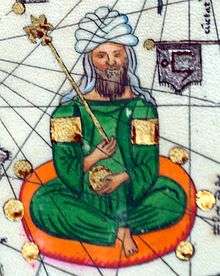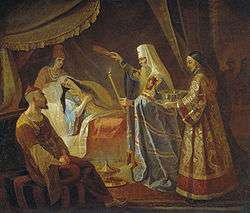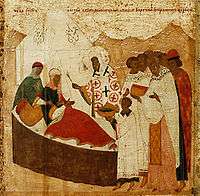Jani Beg
| Jani Beg | |
|---|---|
|
Khan Shahanshah | |
 Jani Beg was the ruler of the Golden Horde. | |
| Reign | 1342–1357 |
| Predecessor | Tini Beg |
| Born | Golden Horde |
| Died |
1357 Sarai |
| Issue |
Berdi Beg Qulpa Nawruz Beg |
| House | Borjigin |
| Dynasty | Golden Horde |
| Father | Öz Beg Khan |
| Mother | Taidula Khatun |
| Religion | Islam |


Jani Beg (died 1357)[1] also called Djanibek Khan[1] was a khan of the Golden Horde from 1342 to 1357, succeeding his father Öz Beg Khan.
After putting two of his brothers to death, Jani Beg crowned himself in Saray-Jük. He is known to have actively interfered in the affairs of Russian principalities and of Lithuania. The Grand Princes of Moscow, Simeon Gordiy, and Ivan II, were under constant political and military pressure from Jani Beg.
Jani Beg commanded a massive Crimean Tatar force that attacked the Crimean port city of Kaffa in 1343. The siege was lifted by an Italian relief force in February. In 1345 Jani Beg again besieged Kaffa; however, his assault was again unsuccessful due to an outbreak of the Black Plague among his troops. It is thought that Jani Beg's army catapulted infected corpses into Kaffa in an attempt to use the Black Death to weaken the defenders. Infected Genoese sailors subsequently sailed from Kaffa to Genoa, introducing the Black Death into Europe.
In 1356 Jani Beg conducted a military campaign in Azerbaijan and conquered the city of Tabriz, installing his own governor there. He also asserted Jochid dominance over the Chagatai Khanate, attempting to unite the three khanates of the Mongol Empire. After accepting surrender from Shaikh Uvais, Janibeg boasted that three uluses (districts/nations) of the Mongol Empire were under his control. Soon after this, Jani Beg faced an uprising in Tabriz resulting in the rise to power of the Jalayirid Dynasty, an offshoot of Ilkhanate and, ultimately, in the death of the Khan.
Russia's Chudov Monastery, founded at about the time of Jani Beg's fall by Metropolitan Aleksii and Sergei of Radonezh was built on land that, according to legend, the Khan had granted to Aleksii as thanks for the miraculous curing of his mother, Taidula, by the latter.
The reign of Jani Beg was marked by the first signs of the feudal strife which would eventually contribute to the demise of the Golden Horde. Jani Beg's assassination in 1357 opened a quarter-century of political turmoil within the Golden Horde. Twenty-five khans succeeded each other between 1357 and 1378.
Popular culture
2012 Russian film The Horde is set during the reign of Jani Beg and is a highly fictionalised narrative of how Alexii healed Taidula from blindness.
See also
References
- 1 2 Kołodziejczyk 2011, p. 4.
Bibliography
- Kołodziejczyk, Dariusz (2011). The Crimean Khanate and Poland-Lithuania: International Diplomacy on the European Periphery (15th-18th Century). A Study of Peace Treaties Followed by Annotated Documents. Leiden: Brill. ISBN 9789004191907.
- David Morgan, The Mongols
- Rosemary Horrox, The Black Death
| Preceded by Tini Beg |
Khan of Blue Horde and Golden Horde 1341–1357 |
Succeeded by Berdi Beg |